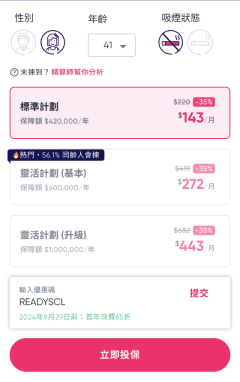Health Insurance Waiting Period
Definition of Waiting Period
The waiting period is a specified period of time after the policy is in effect.
During which, the insurance company will not provide compensation if the policyholder becomes ill. The purpose of this provision is to prevent insured persons from knowingly having certain diseases or potential diseases at the time of application and still applying for insurance in an attempt to defraud compensation.
The waiting period for general medical insurance is usually around 30 days. It is worth noting that some medical insurance plans, such as VHIS, do not have a waiting period!
Which medical insurance plans do not have a waiting period?
Although the voluntary health insurance scheme (VHIS) is a type of medical insurance, it does not have a waiting period!
Note that although VHIS does not have a waiting period, it can still prevent policyholders from applying for insurance knowing that they have certain diseases or potential diseases.
According to the design of the VHIS, if the insured person is found to have “unknown pre-existing conditions” (i.e. symptoms or conditions that the insured person is unaware of but already has) based on medical evidence when making a claim, a waiting period will be added to the policy, and the insurance company may compensate according to the situation:
- The waiting period for all standard plans is 3 policy years, with compensation rates of 0%, 25%, and 50% in the first 3 policy years, and 100% of the expected compensation in the 4th year.
- As for the Flexi plans of each company, they have their own arrangements and can follow the treatment of the standard plans or shorten the waiting period on their own. For example, with Bowtie, the insured person can receive 100% of the expected compensation 90 days after the policy is in effect.
In summary, the difference of “waiting period” for general medical insurance and VHIS are:
- For the former: Everyone has to go through a period of “waiting period” after the policy takes effect, and the insurance company may refuse to compensate in the event of “unknown pre-existing conditions.”
- For the latter: If there are no “unknown pre-existing conditions,” there is no need to go through a “waiting period,” and coverage can be obtained after the “waiting period” in the case of “unknown pre-existing conditions.”
Why do insurance companies set waiting periods?
In fact, waiting periods are not only for the protection of insurance companies but also have important significance for policyholders and insured persons.
First, let’s explain how insurance works. Insurance is based on a large number of people purchasing insurance, and the premiums received become a pool of funds. If an insured person becomes ill, compensation can be paid from the pool of funds. Premium calculations also vary according to factors such as the insured person’s age, health status, lifestyle habits, and family medical history, and may even affect whether they can purchase insurance.
In addition, the incidence rate of different diseases is also one of the factors that affect premiums.
Setting a “waiting period” can create a moral barrier for insurance plans, as much as possible to avoid the situation of applying for insurance with pre-existing conditions. Because if many people only purchase insurance after they become ill, the payout rate will be significantly higher than normal estimates. Therefore, the waiting period is also a protection for honest policyholders.
By the way, insurance should be purchased when young and healthy, without any suspicious symptoms! Otherwise, it may not be possible to purchase insurance after changes in health conditions, or premiums may be higher.
When purchasing insurance, be sure to disclose your health condition truthfully, as if a disease is discovered to have existed before the policy was in effect and you did not disclose it truthfully or concealed it, the insurance company has the right to decline the claim, only reimburse part of the cost, or even “terminate the policy.”
Is it true that no compensation is available for anything during the waiting period?
Claims during the waiting period are generally not accepted, but it also depends on the individual insurance company’s handling approach. For example, if an insured person is accidentally injured and needs hospitalization during the waiting period, it does not involve potential diseases. Related claims are generally not subject to the waiting period’s constraints, and the insurance company may make compensation.
In any case, if anyone, unfortunately, needs to undergo a medical procedure during the “waiting period,” it is worth asking the insurance company how to handle it.
In addition, if there is an opportunity to switch to another insurance company’s plan, it is best to cancel the old policy after the new policy takes effect, so as to avoid a period of no coverage.
- The examples and situations provided above do not take into account the scenario of "unknown pre-existing conditions." According to the VHIS, if the insured person's claim situation is "unknown pre-existing conditions," the insurance company will compensate for eligible expenses according to the waiting period and compensation ratio specified in the policy terms.
- For each claim case, Bowtie's claims team will also conduct a review to prevent the abuse of insurance and unfair treatment of customers.
Of course, the “waiting period” clause is only one of the factors to consider before purchasing insurance. It is more important to carefully examine whether the plan itself is suitable for oneself.
Using medical insurance as an example:
- Do you want to compensate based on the policy year or each injury/illness?
- Is there a lifetime benefit limit?
- Is the policy with guaranteed renewal?
- ^30-year-old male purchasing Bowtie Pink (Semr-Private) with HK$80k deductibles.
